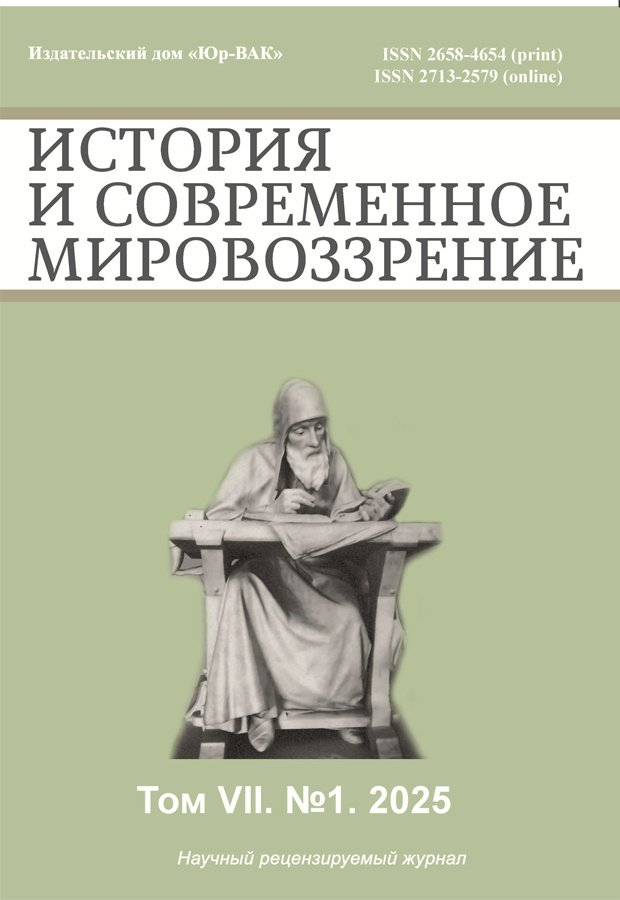Napoleon and antiquity: views of modern historians
- Autores: Artyukh G.Y.1
-
Afiliações:
- Ural Federal University named after the First President of Russia B. N. Yeltsin
- Edição: Volume 7, Nº 1 (2025)
- Páginas: 202-206
- Seção: HISTORIOGRAPHY
- URL: https://journals.eco-vector.com/2658-4654/article/view/679601
- DOI: https://doi.org/10.33693/2658-4654-2025-7-1-202-206
- EDN: https://elibrary.ru/MEBXHG
- ID: 679601
Citar
Texto integral
Resumo
The article attempts to find out the reasons for the marked interest of French and Russian researchers at the turn of the XX — XXI centuries in the problem of reception of ancient heritage during the era of the First Empire in France. Based on the analysis of key studies of recent decades, the nature of the impact of the images of antiquity on the political and cultural life of France in the late XVIII — early XIX centuries has been revealed. It has been established that the interest of historical science in recent decades in this problem is due, firstly, to the general interest of our days in the problems of power representation and, secondly, to the modern era of global changes associated with the collapse of the USSR, the crisis of the United Europe project, of which France is an important subject, and the emergence of China as a superpower in the future. Over the past thirty years, the problem of reception of the past has become an important research area of historical science, which continues to be updated with new research, including on the era of Napoleon.
Palavras-chave
Texto integral
Sobre autores
Gleb Artyukh
Ural Federal University named after the First President of Russia B. N. Yeltsin
Autor responsável pela correspondência
Email: gleb.artyuh@yandex.ru
Código SPIN: 9812-0033
The article attempts to find out the reasons for the marked interest of French and Russian researchers at the turn of the XX — XXI centuries in the problem of reception of ancient heritage during the era of the First Empire in France. Based on the analysis of key studies of recent decades, the nature of the impact of the images of antiquity on the political and cultural life of France in the late XVIII — early XIX centuries has been revealed. It has been established that the interest of historical science in recent decades in this problem is due, firstly, to the general interest of our days in the problems of power representation and, secondly, to the modern era of global changes associated with the collapse of the USSR, the crisis of the United Europe project, of which France is an important subject, and the emergence of China as a superpower in the future. Over the past thirty years, the problem of reception of the past has become an important research area of historical science, which continues to be updated with new research, including on the era of Napoleon.
Rússia, YekaterinburgBibliografia
- Vlasov V. G. Styles in art. St. Petersburg, Kolnya. 1995. 682 p.
- Krotov A. A. Napoleon and philosophy. St. Petersburg, «Vladimir Dal», 2021. 639 p.
- Postnikova A. A. Melpomene in the hands of Napoleon, or theater in the historical politics of the First Empire. // West, East and Russia: Questions of General History. 2014. Vol. 16. 210–224 p.
- Chiglintsev E.A. Reception of antiquity in the culture of the late XIX — early XXI centuries. Kazan, Publishing house Kaz. state Univ., 2009. 290 p.
- Assali J., Bruguière M.-B, Ganzin M. L'influence de l'Antiquité sur la pensée politique européenne, XVI-XXème siècles. Aix-Marseille, 1996. 964 p.
- Berchet J.-C., Bonnet J.-C. L'Empire des Muses: Napoléon les Arts et les Lettres, sous la direction de Jean-Claude Bonnet. P.: Belin, 2004. 496 p.
- Boudon J.-O. Grand homme ou demi-dieu? La mise en place d’une religion napoleonienne, Romantisme, № 100, 1998. 131-141 p.
- Boudon J.-O. Napoleon et l’hellenisme // Anabases, № 20, 2014. 33-48 p.
- Boudon J.-O. Napoleon, le dernier Romain, P.: Les belles lettres, 2021. 168 p.
- Caude É., Périé É., Marcangeli L. Les Bonaparte et l’Antiquité. Un langage imperial. Ajaccio, Albiana. 2021. 156 p.
- Chaillou D. À la gloire de l'Empereur: l'opéra de Paris sous Napoléon I // Napoleonica № 7, La Revue, 2010. 88-105 p.
- Chaillou D. Napoléon et l’Opéra, P.: Fayard, 2004. 465 p.
- Chevallier B. Napoléon. Les lieux du pouvoir. Cesson-Sévigné. Artlys, 2004. 128 p.
- Dousset-Seiden C. La nation francaise et l’Antuquite a l’epoque napoleonienne // Anabases. Tradition et receptions de l’antiquite, 2005. V. 1. 59–74 p.
- Fazio M., Frantz P., De Santis V. Les arts du spectacle et la reference antique dans le théâtre européen (1760-1830). P.: Classiques Garnier, 2018. 406 p.
- Lacave-Allemand M., Lacave M. L’Antiquité dans la peinture en France, 1791–1880: une analyse quantitative à travers les Salons et les Prix de Rome// Anabase. № 29. 2019. 37–70 p.
Arquivos suplementares









